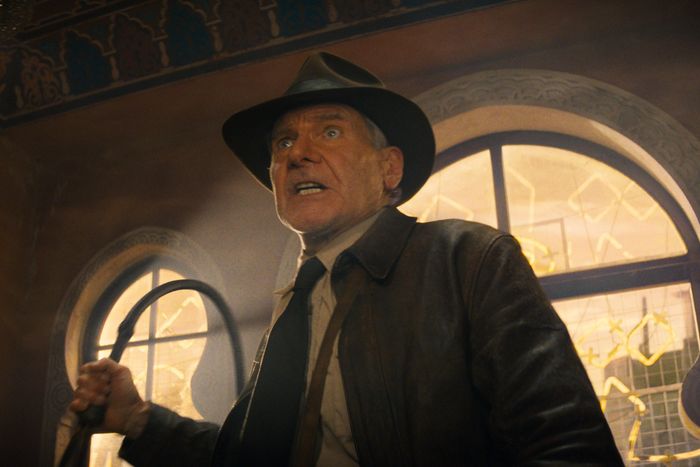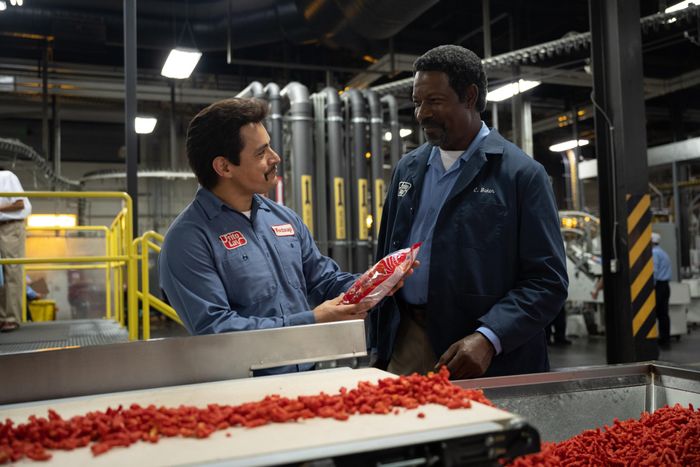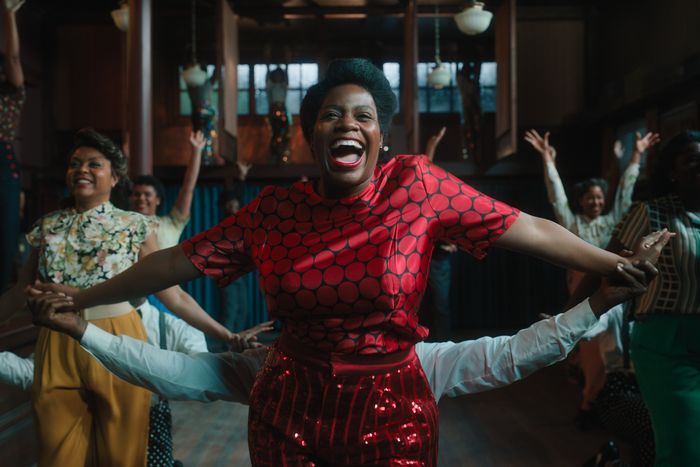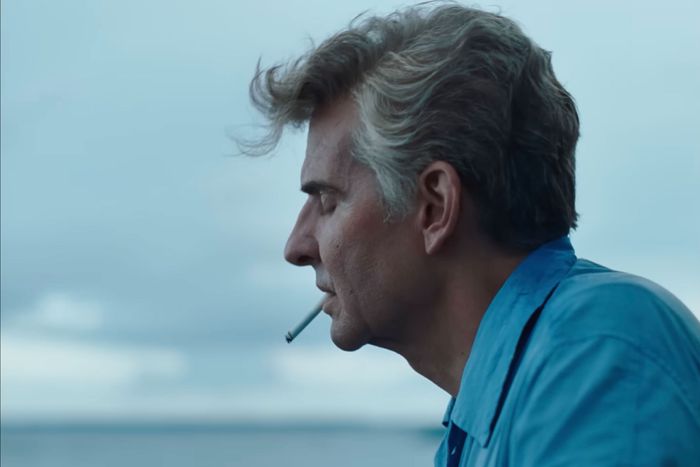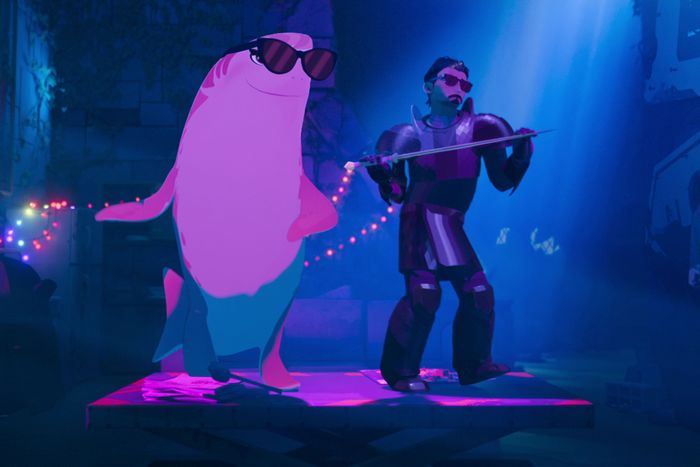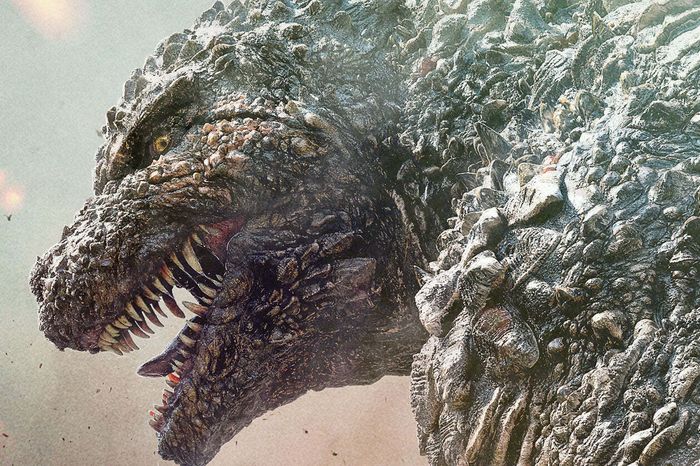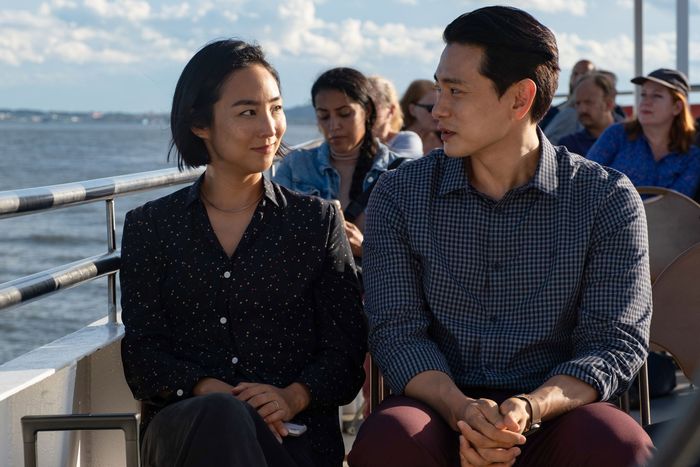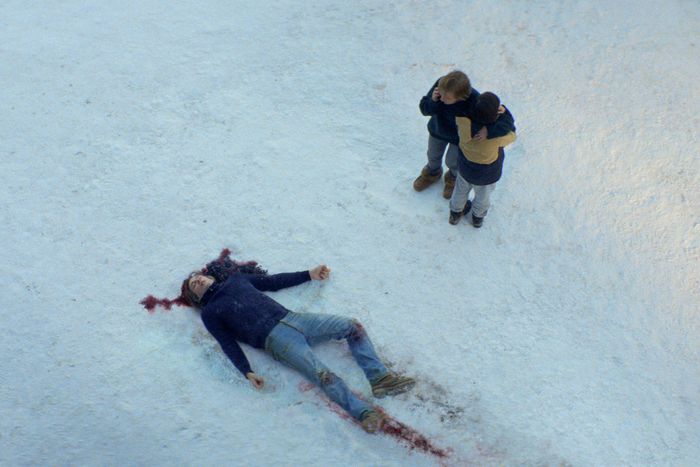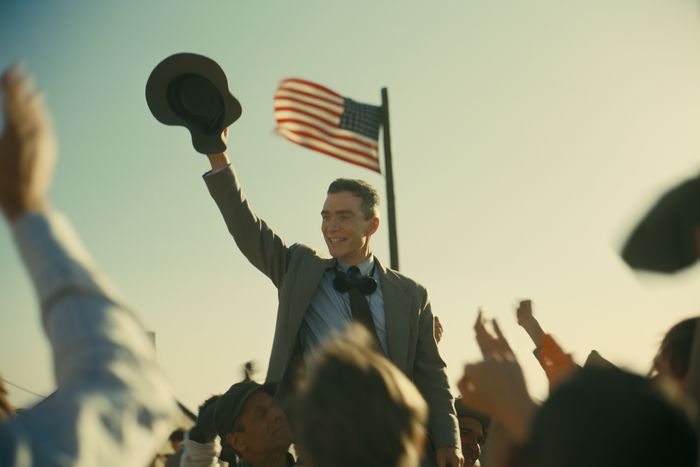
This is a strong year for the Academy Awards. The 53 feature-length and short films that were nominated in 2024 are, in the aggregate, the most impressive (to me) in years, punctuated by a Best Picture top ten that is easily the best (according to me) since the category expanded in 2010. There are films appearing in the high 30s of this ranking that I would enthusiastically recommend to friend or stranger. There are honestly only two movies on this list that I thoroughly dislike. Two! I’ve been ranking Oscar nominees for almost a decade, and there have been years where it’s taken until the 20s before I get to movies that I admire. So even though we’re not accustomed to doing this, and even though some truly worthy films and performances got shunned this year, I’m taking a moment to applaud the Oscar voters for doing a good job.
That said, the challenge in ranking a group of 53 mostly-quite-good movies is asking what separates good from great from transcendent. Does a movie with lesser ambitions that succeeds more consistently outrank a daring but uneven movie? Does a shorter film (or short) that leaves us wanting outrank a longer movie that has its moments but overstays its welcome? Does Hayao Miyazaki’s master status outrank a dog and a robot who are in love? The answers are: sometimes, maybe, and no. Remember: this ranking is subjective and based on nothing but my own personal, whimsical evaluation. Enjoy.
53. War Is Over! Inspired by the Music of John and Yoko
Directed by: Dave Mullins
Nominations: (1) Best Animated Short
We are in the middle of a truly abhorrent era for on-the-nose, smug, corny needle drops, and it’s not like War Is Over ought to pay for the sins of Madame Web or Suicide Squad. But when the titular song stomps into the final minutes of this short film to provide the stunningly obvious denouement, you sure wish it would pay for something. Wouldn’t it be nice if people were pen pals instead of opposing soldiers? That’s about as much thought as went into this, the worst Oscar-nominated film of 2023.
52. The After
Directed by: Misan Harriman
Nominations: (1) Best Live Action Short
David Oyelewo produces and stars in this movie about a man grieving the loss of his family in a violent tragedy. There’s a trend in the short-film categories, especially lately, of nominating films that lean heavily on random acts of violence and their aftermath, and that trend has begun to feel cheap and/or cynical.
51. Elemental
Directed by: Peter Sohn
Nominations: (1) Best Animated Feature
Yes, it does feel pretty silly to nitpick the invented reality of an animated movie. But Elemental makes it impossible not to! For Pixar’s parable about racial and ethnic divisions expressed through the four core elements, there are Fire People, Water People, Wind People, and Earth People. They never mix because bad things could happen, so of course we get a love story about a watery Romeo and his fiery Juliet. And since nobody involved in the production has done a good job of defining how these elements affect one another’s environments — i.e. the fire girl incinerates everything she touches only sometimes; water is meant to douse fire, but fire can also evaporate water; fire can travel underwater in an … air (???) bubble (???) — you spend the whole movie lowkey stressed out. And all for the pleasure of a soggy (pun intended, not proudly) romance whose best joke is about a male-identified water-person crying all the time.
50. Indiana Jones and the Dial of Destiny
Directed by: James Mangold
Nominations: (1) Best Original Score
Up until the final quarter of this movie — the 5th Indiana Jones big-screen adventure, and first without Steven Spielberg in the director’s chair — nothing so terribly objectionable occurs. However, not much great happens either. Harrison Ford and Phoebe Waller Bridge never quite get their contrasting vibes to spark, the action pieces feel labored, and the less said about that AI de-aging in the opening sequence, the better. Then the time-travel happens, at which point you’re either happy to see the film take some kind of big swing, or it’s too silly to bear. This low ranking probably tips my hand here.
49. Rustin
Directed by: George C. Wolfe
Nominations: (1) Best Actor
Bayard Rustin’s life deserved a great biopic. A Black, gay political activist who was the principal architect of the March on Washington, only to get pushed back behind the scenes for political and homophobic reasons, Rustin’s story is complex and esteemed. Unfortunately, screenwriter Dustin Lance Black doesn’t provide a script worthy of Colman Domingo’s committed performance, saddling him with groaner dialogue and cliche subplots. Meanwhile, theater great George C. Wolfe isn’t able to give the flat script any dimension.
48. Nǎi Nai & Wài Pó
Directed by: Sean Wang
Nominations: (1) Best Documentary Short
There’s a fine message behind Wang’s movie, about appreciating his paternal and maternal grandmothers (one 80-something, the other 90-something), released after a time when hatred and acts of violence against Asian people were on the rise. And the grandmothers do, in fact, seem like a hoot. But the bulk of this movie has the veneer of young people making their grandparents do funny reactions on TikTok. Stop making your grandparents do stuff for TikTok, everybody.
47. Golda
Directed by: Guy Nattiv
Nominations: (1) Best Makeup/Hairstyling
As an achievement in makeup, nominees Karen Hartley Thomas, Suzi Battersby, and Ashra Kelly-Blue do the work of making Oscar-winner Helen Mirren look plausibly like former Israeli prime minister Golda Meir. That Mirren’s very recognizable voice and general way of being stomp through these efforts anyway is only the tip of an iceberg of reasons to skip this film if you’re rushing to see great Oscar movies ahead of the March 10 ceremony.
46. Island in Between
Directed by: S. Leo Chiang
Nominations: (1) Best Documentary Short
The decades of political tension between China and Taiwan are reflected upon in this slight but reflective short film. Chiang is divided between his past and present, as well as the Chinese, Taiwanese, and American influences, which he depicts with open-ended sensitivity. That sensitivity does cause this film to fade within the context of 53 movies all vying for awards. Lined up against its competition, Island in Between is perhaps too delicate for its own good.
45. Flamin’ Hot
Directed by: Eva Longoria
Nominations: (1) Best Original Song
Diane Warren continues her streak of being responsible for the most random movie’s appearance on the Oscar ballot, but for the first time in several years, it’s not one of the absolute worst! Flamin’ Hot is a solidly okay directorial debut for Eva Longoria, an engaging yarn about a blue-collar Mexican-American who gave the world the gift of Hot Cheetos, thus rising from rags to riches. Much like the processed cheese puff with which it shares its name, Flamin’ Hot does not boast particularly complex flavors, but it hits the same one or two notes with confidence. And unlike so many of the other modern-product origin stories we’ve been getting over the last few years, this one isn’t about an invention that made the world demonstrably worse, so there’s that.
44. Invincible
Directed by: Vincent René-Lortie
Nominations: (1) Best Live-Action Short Film
Well, it sure looks like somebody loved Mommy, the 2014 Xavier Dolan movie that ends with its unruly, angel-faced, white teenage boy breaking out of his juvenile detention center. René-Lortie picks up where that movie left off and then bounces around in time as young Marc (Léokim Beaumier-Lépine) enjoys a weekend furlough with his family and then, back in juvie, rebels against his well-meaning counselor. Besides wondering what exactly is happening to Quebec’s wayward teens, you also end up wondering what Invincible’s fatalistic framing is meant to accomplish. Ultimately, the film doesn’t offer nearly enough insight into Marc to justify such an approach.
43. Bobi Wine: The People’s President
Directed by: Christopher Sharp; Moses Bwayo
Nominations: (1) Best Documentary Feature
The political unrest and brutal repression that’s been happening in Uganda for the last 35-plus years has already given birth to a host of documentaries, and there is a recognition of that fact from Bobi Wine himself in this film. Wine is an activist, politician, and pop star in Uganda, which has existed under the autocratic rule of Yoweri Museveni since 1986. He opposes the leadership at great personal risk, and the moments of highest tension in the film concern attempts by the government to arrest, detain, or assassinate him. The filmmakers’ access to Wine and his campaign give the audience no room to distance themselves from the bleak and infuriating situation in east Africa, though there are moment where distance and context might have served the audience well, in terms of conveying the terms of the conflict taking place.
42. Pachyderm
Directed by: Stéphanie Clément
Nominations: (1) Best Animated Short
This French animated short film has no shortage of arresting imagery, drawn in warm summer colors. It evokes nostalgia but with a slight undercurrent that something else is going on. Very slight. Within such limited running time, there is pressure on short films to blare the themes and messages loudly and often so that their impact is felt; the approach can be effective, or gauche. Then there are certain shorts where the filmmakers have decided to remain, as Robin Williams once said of his Good Will Hunting director Gus Van Sant, so subtle they’re subliminal. Pachyderm unfolds like a dream, until the part where that dream turns into a nightmare. Clément is so delicate with his revelations to that point, that the audience might struggle to receive them.
41. American Symphony
Directed by: Matthew Heineman
Nominations: (1) Best Original Song
American Symphony was one of several biographical documentaries about famous entertainers this year that weren’t able to crack the Documentary Feature lineup. The film, centering on prolific, multi-hyphenate musician Jon Batiste, found its way into the Original Song lineup instead. Batiste’s career blew up during the pandemic, while his wife battled leukemia, and the film that resulted from that time often feels awkwardly bifurcated. As a document about a singular talent going from street musician to Colbert bandleader to Grammy Awards sensation, it’s a fun window into Batiste’s meteoric rise. As a sensitive story about two lovers battling through a pitiless diagnosis, it’s effective. As both, the whole is less than the sum of its parts.
40. Red, White and Blue
Directed by: Nazrin Choudhury
Nominations: (1) Best Live Action Short
Pitch Perfect’s Brittany Snow de-glams to play an Arkansas waitress and single mom who’s dealing with past-due bills and a positive pregnancy test. So she has to find a way to scrounge up money to pay for an abortion and then — since abortion is effectively illegal in Arkansas now — cross state lines to reach a clinic that will perform the procedure. The film takes a turn two-thirds of the way through and, for as much as rug-pulling tragic twists in nominated short films have grown irksome lately, the one here is affecting, and Snow performs it admirably. Choudhury leans a little too hard on the women-helping-women theme right at the end, but otherwise it’s an engaging and timely story.
39. The Color Purple
Directed by: Blitz Bazawule
Nominations: (1) Best Supporting Actress
Not only did Blitz Bazawule’s film have to live up to the stage musical that won Best Actress and Best Revival of a Musical when last it graced the Broadway stage, it also had to live up to the complicated legacy of Steven Spielberg’s 1985 film. That bar proved to be too high to clear. The cast boasts an excess of talent, not least a plucky Fantasia Barrino, a regal Taraji P. Henson, and a frisky Danielle Brooks, making room for herself alongside Oprah in this film’s legacy. And yet these performances are all too often let down by confoundingly flat production choices that rob them and the story they’re telling of precious energy.
38. Letter to a Pig
Directed by: Tal Kantor
Nominations: (1) Best Animated Short
There is some truly stunning animation in this meditation on collective memory and trauma. An elderly Holocaust survivor speaks to a classroom about his traumatic experiences and the pig he credits with saving his life. Afterwards, one of the students drifts off into an intense and ever-shifting dream that places her inside these inherited memories of trauma. Kantor combines hand-painted animation with live-action footage, usually within the same image: a person will have a drawn face but a live-action eye or hand or mouth. For a story where the symbol of the pig keeps shifting meaning — does it represent salvation? The inhumanity in man? The collective other? — the animation also asks you to constantly reconsider the visual storytelling as well. It’s the most thrillingly constructed animation of the nominees.
37. The ABCs of Book Banning
Directed by: Sheila Nevins, Trish Adlesic, Nazenet Habtezghi
Nominations: (1) Best Documentary Short
There is admittedly very little in the way of filmmaking innovation to be found in The ABCs of Book Banning. This is an advocacy project more than an artistic one. But as a feat of casting, this movie has selected the best group of kids to speak intelligently and experientially on why these books that are being banned nationwide are so enriching for them. Sheila Nevins spent decades building up HBO Documentaries, and her instincts for getting an argument across in the most accessible and effective way are on display here.
36. Nyad
Directed by: Elizabeth Chai Vasarhelyi, Jimmy Chin
Nominations: (2) Best Actress; Best Supporting Actress
When Barbie’s Margot Robbie got snubbed on Oscar nomination morning, Nyad bore much of the brunt of Barbie Nation’s dissatisfaction. The film makes for an easy target: it hits a lot of the typical biopic notes (unnecessary flashbacks to childhood, go away!) and has fallen prey to the usual real-life bugaboos (Diana Nyad, liar!). Annette Bening has definitely delivered more subtle, skillful performances in her career. But whether or not Nyad achieves greatness, it’s still a story of tetchy queer friendship that more or less works, in large part to Bening and Jodie Foster’s lived-in, delightfully crabby chemistry with each other.
35. Our Uniform
Directed by: Yegane Moghaddam
Nominations: (1) Best Animated Short
The shortest of any of this year’s nominees at only seven minutes, this Iranian movie is a kind of memoir about growing up as a young girl in Tehran via the canvass — literally — of the hijab she must wear. The conceit of the free-form animation drawn onto actual fabric makes for a captivating viewing experience, even if the story seems to fade out too soon.
34. Maestro
Directed by: Bradley Cooper
Nominations: (7) Best Picture; Best Actor; Best Actress; Best Original Screenplay; Best Sound; Best Cinematography; Best Makeup and Hairstyling
So… what was up with Maestro? I can’t pretend to be able to answer in one paragraph the question it’s taken the entire movie-watching community the better part of Oscar season to answer. Bradley Cooper clearly took great care with his Leonard Bernstein project and emerged with a movie about … a gay guy who wishes he’d been more of a wife guy? A prolific and revered musical talent who we see making music maybe twice? The omnipresence of Snoopy in our cultural conversations? Whatever Cooper’s take on Bernstein was, and however much of himself he saw in Bernstein’s story, Cooper undeniably threw everything he had at this movie, resulting in a film that is frequently a wonder and sometimes embarrassing. Portrait of an Artist as a Try-Hard. The Academy has nominated worse things for far more awards.
33. Ninety-Five Senses
Directed by: Jared and Jerusha Hess
Nominations: (1) Best Animated Short
Husband and wife writers and filmmakers Jared and Jerusha Hess (Napoleon Dynamite) directed this engaging and often surprising short, which takes the form of an old man monologuing about his life through the prism of his five senses. At first, he seems like a regular old coot (did you know smartphones are ruining our eyesight?), until the story pulls a reveal and recontextualizes the story. Tim Blake Nelson voices the old man, lending his story spark and texture. Five different teams of animators worked on the film, each taking up a different sense-based segment. It’s an ambitious idea, though the segments don’t seem diverse enough in form or mood to justify the gambit.
32. The Creator
Directed by: Gareth Edwards
Nominations: (2) Best Sound; Best Visual Effects
Gareth Edwards, who made the 2014 Godzilla that was visually breathtaking and a giant flop from a character perspective, tries to escape the same fate here and does, if barely. The film tells the story of human-vs.-AI war where John David Washington must destroy the AI’s deadliest weapon but can’t because that weapon has been made in the form of an adorable young girl. The visual effects work on “Alphie,” the simulant child, is breathtaking, and Edwards does some great world-building, even if the rules of the AI universe are often pretty stupid (isn’t the whole point of self-aware AI that you can’t just flip a switch and turn them off?). But I ultimately bumped The Creator up a few slots for the presence of Allison Janney wearing Sandra Hüller’s Anatomy of a Fall hair as a battle-crazed army general.
31. Napoleon
Directed by: Ridley Scott
Nominations: (3) Best Production Design; Best Costume Design; Best Visual Effects
Ridley Scott, what are you up to with this? Clearly, the legendary director of Blade Runner and Gladiator has been feeling mischievous lately, given the comedy beats thrown into The Last Duel and generally everything about House of Gucci. With Napoleon, he’s done one of the most reckless things a filmmaker can do: give Joaquin Phoenix free reign to goof off. Certainly, an irreverent portrait of Napoleon Bonaparte is warranted, but at two and a half hours of alternating brutality and buffoonery, this movie really tries one’s patience.
30. Mission: Impossible — Dead Reckoning
Directed by: Christopher McQuarrie
Nominations: (2) Best Sound; Best Visual Effects
I know the same can probably be said about all the movies in this series, but this one was all a little silly, wasn’t it? Silly isn’t necessarily bad when we’re talking about a series that once paid Wolf Blitzer to pretend to pull his face off, but this installment felt a bit too loose in its shoes. AI anxiety showed up in this plot too, as Tom Cruise’s Ethan Hunt has to battle against an artificial intelligence known as “The Entity,” which can replicate voices, intercept communications, and generally clear the way for all sorts of shocking reveals. Fans of the series were most upset about the film’s treatment of Rebecca Ferguson’s Ilsa Faust, which, fair enough, but maybe she didn’t feel like sticking around for Cruise to spend twenty minutes setting up his latest self-conscious death-defying stunt.
29. The Barber of Little Rock
Directed by: John Hoffman, Christine Turner
Nominations: (1) Best Documentary Short
Addressing the wealth gap in this country can often seem so daunting that it’s easier to just rail against it than bang your head against a wall trying to fix anything. The beauty of The Barber of Little Rock is that it shows how exhilarating small victories in this battle can be. The film examines People Trust, the only Black-owned community development financial institution in Arkansas. With an average loan of $5,000 for businesses and $1,000 for individuals, People Trust helps the Black community in Little Rock find some kind of toehold in an economy that is stacked against them. The filmmakers smartly alternate between pushing in on scenes of loan application meetings and pulling back to talk about more wide-ranging issues, like how there aren’t any banks in the Black neighborhoods of Little Rock. Other documentaries are more harrowing, but The Barber of Little Rock definitely makes the case for the urgency of its message.
28. Knight of Fortune
Directed by: Lasse Lyskjær Noer
Nominations: (1) Best Live Action Short
It’s fitting to the live-action shorts category that the biggest dose of levity in the batch comes not from the Wes Anderson movie, sprightly as it is, but from this Danish film about a man (and then another man, and then a whole group of people) processing the loss of a loved one. What starts with an old man getting ushered into a hospital room to say goodbye to his dead wife soon introduces a second man, this one far more comfortable — even eager — to express his grief. The audience’s perception of what’s happening on screen shifts a few times, and it’s a credit to Noer’s nimble direction that each time we re-assess these characters, they seem funnier or more touching.
27. Spider-Man: Across the Spider-Verse
Directed by: Joaquim Dos Santos, Kemp Powers, Justin K. Thompson
Nominations: (1) Best Animated Feature
Absolutely breathtaking in terms of animation. A testament to testing the limits of creativity when it comes to depicting superhero stories. The visuals are dizzying, impressionistic, and playful. If only movies didn’t also need stories. Where Into the Spider-Verse was an adventurous origin story with a fun cast of acolytes, Across the Spider-Verse gums up the works with what feels like extra-narrative bureaucracy — I never want to watch another superhero movie wrestling with what is or is not official canon. And then once the movie finally gets past all that red tape and is about to become a fun movie about crimefighting friends, here comes the abrupt cliffhanger. One of the year’s biggest letdowns.
26. The Wonderful Story of Henry Sugar
Directed by: Wes Anderson
Nominations: (1) Best Live Action Short
There are some who would take the nomination — and possible win — for The Wonderful Story of Henry Sugar as a suitable consolation prize for Asteroid City getting completely blanked on the Oscar ballot. I am not one of those people. The Wonderful Story of Henry Sugar isn’t a patch on Asteroid City in terms of humor, scope, or story, and the latter’s omission from the ballot is a shame on the Academy’s part that won’t be helped by throwing a bone at one of Anderson’s shorts. That said … this is pretty good. Benedict Cumberbatch and Ben Kingsley prove to be excellent additions to the Wes Anderson repertory players, and at 40 minutes, this tall tale manages to screwball its way through stories of comedy, intrigue, and ultimately sadness. The live-action short category hasn’t had it this good in a while.
25. Guardians of the Galaxy, Volume 3
Directed by: James Gunn
Nominations: (1) Best Visual Effects
Bradley Cooper’s most effectively emotional performance of 2023. There was a not-insignificant strain of complaint about Guardians 3 trading in its fun irreverence for goopy emotionalism and melodrama. Not having been a particularly huge fan of the winking irreverence in the previous two Guardians films, I was thrilled to finally be wrapped up in part three. Rocket’s flashbacks provided the film with the first genuine stakes of the entire series, while the rest of the characters deepened their relationships to each other, and not just the obvious relationships either. Maybe I just ultimately want a movie where Karen Gillan’s Nebula learns to be a nice person, one relationship at a time. Regardless, the visual effects are good, and in a year where almost nothing went right for Marvel, they ended this trilogy on a perfect note.
24. El Conde
Directed by: Pablo Larraín
Nominations: (1) Best Cinematography
Larraín took some time off from eulogizing the Western world’s most tragic political wives to imagine a world where Augusto Pinochet, the brutal Chilean dictator, was in fact a hundreds-year-old vampire (wait until you find out who his mother is). It’s as dark as dark comedy gets, though it once again allows Larraín — who has directed several films either explicitly about Pinochet’s junta or set during his reign — to purge the demons of his home country. This time, he takes that task literally. Edward Lachman’s striking black-and-white cinematography gives the whole film a gothic air, even as the events of the film, which include Pinochet’s greedy children scheming to dispatch their immortal father so they can finally get their inheritance, lean towards farce.
23. The Last Repair Shop
Directed by: Ben Proudfoot, Kris Bowers
Nominations: (1) Best Documentary Short
Those who try to watch all the Oscar nominees might remember Kris Bowers from the nominated short A Concerto Is a Conversation from a few years ago. That film centered him, while this one focuses on a handful of people in Los Angeles who fix musical instruments for school children. Their stories are compelling, and strung together there is a continuum of how music and arts education enriches the lives of students, teachers, and everybody who works within its ecosystem. This would have otherwise earned lesser placement on this list if not for the incredibly touching orchestra performance that plays under the closing credits that ends the film on the perfect note.
22. The Teachers’ Lounge
Directed by: İlker Çatak
Nominations: (1) Best International Feature
The worst thing you can say about The Teachers’ Lounge is that it sometimes feels like a movie that could have ended up a live-action short film nominee. It’s a morality tale about minding your own damn business and not being so quick to accuse people, one which takes a few potentially dark turns. The voters in the short-film categories love those morality tales. But The Teachers’ Lounge does more than just wag a finger at its main character — a schoolteacher who thinks a co-worker stole money from her purse. Çatak instead builds an entire universe out of the school, including a politically cowardly principal, gossipy teachers with no sense of loyalty, and best of all, a student newspaper club that becomes Woodward and Bernstein trying to get to the bottom of these serious accusations. Spotlight has got nothing on these kids.
21. Society of the Snow
Directed by: J.A. Bayona
Nominations: (2) Best International Feature; Best Makeup and Hairstyling
The infamous 1972 plane crash that left a Uruguayan rugby team stranded in the Andes mountains for 72 days has been dramatized on film before. The 1992 American film Alive leaned heavily on the most sensational element of the story: that the 16 survivors had to resort to cannibalism to survive. That element remains in Society of the Snow, but Bayona is determined to cast his net wider. The film is viscerally upsetting in its depiction of the crash, the resulting injuries, and the panic that sets in among the survivors as they’re surrounded by their dying friends and loved ones with very little hope of survival. Bayona is perhaps unsettlingly good at this kind of thing, having injected similar visceral trauma into The Impossible. It’s a hard watch but undeniably skillful in bonding the audience to these survivors.
20. The Eternal Memory
Directed by: Maite Alberdi
Nominations: (1) Best Documentary Feature
The heartbreak and cruelty of an Alzheimer’s diagnosis lends itself effectively to movies, whether fictionalized or documentary. Maite Alberdi’s film doesn’t linger on the hardships but rather shows how fiercely those living with Alzheimer’s — and their loved ones — try to hold onto the memories and wits that are still there. Augusto Góngora is a prominent Chilean cultural journalist who’s been living with Alzheimer’s for eight years; his wife, Pauli, was a minister of culture. Alberdi reflects on the fact that these are two people who have spent their lives dedicated to tending to the cultural legacy of their country, a legacy that had to endure Pinochet’s repressive regime and came out the other side of it.
19. Io Capitano
Directed by: Matteo Garrone
Nominations: (1) Best International Feature
Italian director and Cannes favorite Matteo Garrone got his first Oscar nomination for this film about a pair of young Senegalese men who dream of emigrating to Europe, where the streets are paved with record-industry contracts. Inevitably, their journey from West Africa, across the border into Niger, through the pitiless Sahara, and to the shores of Tripoli is fraught with danger, corruption, and cruelty. But while Garrone never sidesteps the brutality that these immigrants go through, he’s never gratuitous, nor does he lose sight of the fact that this is a film about characters, not statistics.
18. Nimona
Directed by: Nick Bruno, Tony Quane
Nominations: (1) Best Animated Feature
Quietly sitting in a Netflix queue somewhere for the better part of the year, Nimona turns out to be one of the best-looking, most refreshingly written, and outright best animated movies of the year. This story of a friendship between an exiled knight and misunderstood shapeshifter takes on many classic themes of animated movies (don’t judge a book by its cover, mostly) in a way that feels modern but not faux-edgy. The medieval futurism of its setting allows the writers to play with classic adventure-genre tropes while modernizing the action and the emotions. Watch how seamlessly Nimona places a queer character at the center of its movie, without back-patting ceremony but also without any kind of “we can cut this part out for the Chinese release” skittishness, and then tell me Disney and Pixar shouldn’t be hanging their heads in shame.
17. The Boy and the Heron
Directed by: Hiyao Miyazaki
Nominations: (1) Best Animated Feature
The legendary Japanese animator Hiyao Miyazaki received his fourth nomination and could get his second win in this category for his latest film, which is said to be his swan song. Boiling The Boy and the Heron down to a simple plot description is daunting, but at its root it’s about a young boy whose mother has died and whose father wants to remarry. It’s also about a heron that won’t leave him alone. Or is the heron a goblin-like man in a heron suit? Or is the movie about parakeet hordes and bubble-like spirits or a wizard stacking stones? Miyazaki creates dreamworlds as well as any filmmaker ever has, so even if the layered metaphors of the story are daunting, the visual style invites you to play along. The film’s strongest message concerns whose responsibility it is to build a better world. It’s easy to see this as Miyazaki, having spent a lifetime building better worlds in his movies, handing that task off to the next generation of filmmakers.
16. American Fiction
Directed by: Cord Jefferson
Nominations: (5) Best Picture, Best Actor, Best Supporting Actor, Best Adapted Screenplay, Best Original Score
Based on Percival Everett’s 2001 novel Erasure, Cord Jefferson’s directorial debut is a narrative duplex. On one side is an acidic satire of the literary world (and by extension the entertainment industry as a whole) and the way it only seems to reward certain types of Black stories, i.e. stories that let white people purge their guilt by feeling sympathy for extravagant Black pain, poverty, violence, etc. It’s in this world that Jeffrey Wright’s Monk, a frustrated author, is banging his head up against the walls of an industry that has defined only one way to be “authentically” Black. On the other side is a family drama which finds Monk no less frustrated, with a sister who’s got his number, an irresponsibly hedonistic brother (the nominated Sterling K. Brown), and a mother dealing with dementia. Jefferson works hard to balance both sides of this story, though it’s likely that the effort falls apart without Wright delivering one of his best performances, both righteously frustrated and full of regret.
15. 20 Days in Mariupol
Directed by: Mstyslav Chernov
Nominations: (1) Best Documentary Feature
Documentaries often walk a fine line between cinema and journalism. 20 Days in Mariupol is foremost a work of journalism, the most vital and brave kind imaginable. Chernov spent nearly three weeks in the Ukrainian city of Mariupol, on the front lines of the Russian invasion, as the city was shelled by Putin’s forces. The film exists as two things simultaneously. Firstly, it’s a document of the terror inflicted upon the residents as well as their resilience (especially those who attempted to keep the hospitals running). This is also footage that Chernov was getting out to news outlets in real time, as it was necessary to help thwart the Russian disinformation campaign. For its stripped down urgency and the frustration, rage, and fear in the eyes and hearts of the people on camera, 20 Days in Mariupol is journalism that becomes cinema, in all its awful necessity.
14. Robot Dreams
Directed by: Pablo Berger
Nominations: (1) Best Animated Feature
Surprise! The best animated feature of 2023 wasn’t the Miyazaki or the Spider-Man but rather the Spanish-French co-production about a dog and a robot in 1980s New York City who are wordlessly in love. Berger, adapting Sara Varon’s comic, creates a bright, busy NYC, but one in which a solitary Dog finds himself lonely and looking to purchase a Robot friend from a TV commercial. The lack of dialogue makes the fast friendship between them more easily take on the characteristics of a romance, something that becomes clearer when the pair are separated and later encounter each other a year later. This movie has neither the hype nor the reach of its competitors in the Animated Feature category, but it stands toe-to-toe with them in terms of storytelling. At 102 minutes, it’s long and episodic, but that’s all in service to its bittersweet ending.
13. To Kill a Tiger
Directed by: Nisha Pahuja
Nominations: (1) Best Documentary Feature
A truth known by progressives of all stripes is that it’s one thing to work to enact protections, change laws, and push judicial precedent. It’s another thing entirely to change the hearts and minds of people who are entrenched in backwards and hateful beliefs. That struggle is at the heart of To Kill a Tiger, which focuses on the aftermath of the rape of a 13-year-old Indian girl and her family seeking justice against the perpetrators. The frustration that settles in among the girl’s parents, advocates, and Pahuja herself is matched by the stubborn brutality of the villagers, who want “what’s best for the village,” i.e. to make it all go away. (Local custom would have the girl married to one of her rapists.) There is a fierce specificity to this story that nonetheless radiates outward, across cultures and oceans.
12. Four Daughters
Directed by: Kaouther Ben Hania
Nominations: (1) Best Documentary Feature
The documentary branch can sometimes give an edge to a filmmaker who challenge the form of a documentary while still staying true to the documentary spirit. Such was the case with Four Daughters, where director Kaouther Ben Hania unpacks the sad events in the lives of a Tunisian family through interviews with the remaining family members as well as by hiring actresses to play the mother’s two absent daughters (and another to play the mother) in reenactments. What elevates Four Daughters to elite status is that by introducing these actresses, Ben Hania also introduces their perspectives. The best parts of the movie are when the real people and the performers are interacting with each other, discussing the events of the film and debating generational perspectives in a story about a mother desperately trying to hold onto her daughters, while the parallel threats of westernized culture and fundamentalist religion pull them away.
11. Godzilla Minus One
Directed by: Takashi Yamazaki
Nominations: (1) Best Visual Effects
Sometimes the industry narratives just write themselves. In a year where Marvel, DC, Disney, and Pixar were all flopping hard with some all-time-worst output, it’s the oldest monster on the block who comes back around to rescue action cinema. Despite its title, Godzilla Minus One is less an origin story of this terror of the Pacific, but rather a first-contact story that focuses on a group of Japanese soldiers, having barely survived World War II, who must fight to save themselves and their loved ones from this new monster at a time when their country couldn’t make the save themselves. On a human level, this is by leaps and bounds the best Godzilla story in decades. And the visual effects ain’t too shabby either, evoking menace and terror without feeling like a video game.
10. Poor Things
Directed by: Yorgos Lanthimos
Nominations: (11) Best Picture, Best Director, Best Actress, Best Supporting Actor, Best Adapted Screenplay, Best Original Score, Best Production Design, Best Cinematography, Best Makeup/Hairstyling; Best Costume Design; Best Film Editing
It’s a sign of a steadily more daring Academy membership that a movie about a Frankenstein-esque doctor who puts the brain of an infant into the body of a dead woman and then has said woman go on a sex tour of the Mediterranean to learn about herself and her body in the Victorian age got eleven nominations. Featuring some of Emma Stone’s best work ever and a script by Tony McNamara that is wildly funny, Poor Things is a scream of a good time while thematically solid enough to pair well with any number of its Best Picture competitors (it’s Barbie but it fucks; it’s Oppenheimer but the hydrogen bomb is female sexuality; it’s Anatomy of a Fall but instead one big fall, it’s just Mark Ruffalo flopping all over the place).
9. The Zone of Interest
Directed by: Jonathan Glazer
Nominations: (5) Best Picture, Best Director, Best Adapted Screenplay, Best International Feature, Best Sound
To call The Zone of Interest a “Holocaust movie” would be both literally accurate and yet spiritually false. So much of the story and character work in The Zone of Interest works hard to distance the Holocaust from thought and deed, even when Auchwitz is literally right next door. There is a terrifying discipline to Glazer’s work here as he refuses to sell out his concept, which sees a German family living, laughing, watching the kids play, having neighbors over for tea, all while treating the human incinerators next door as just another piece of German industry. These aren’t the monsters next door, though their willingness to compartmentalize and collaborate is indeed terrifying in its own way. At any moment Glazer could falter and tip his hand, some small gesture to let the audience know that we’re all wise to what’s really going on, and isn’t it so awful? If he does that, the entire house of cards collapses, and The Zone of Interest turns into one more piece of liberal reassurance. Glazer holds fast, though, keeping us in the audience as removed from the camps as his characters are and guilty by association as a result.
8. Past Lives
Directed by: Celine Song
Nominations: (2) Best Picture, Best Original Screenplay
Expectations were high for Past Lives coming out of Sundance last year, given how enthusiastically critics and audiences responded to this delicate, modern story about regret, identity, and romantic roads not taken. That Song’s film probably just missed the cut on a handful of categories is small consolation, but this is a film people will remember. For a film with such a deliberately specific narrative, there are a number of access points to the story, and that’s a credit to Song’s writing and the intelligent and emotive performances by Greta Lee, Teo Yoo, and John Magaro. It’s impossible, after this film, to look around at strangers at a bar late at night and not wonder what highly idiosyncratic romantic entanglements they might be softly working through.
7. Barbie
Directed by: Greta Gerwig
Nominations: (8) Best Picture, Best Supporting Actor, Best Supporting Actress, Best Adapted Screenplay, Best Original Song (x2), Best Production Design, Best Costume Design
We almost lost it. After six months of good vibes and friendly competition between Big Serious Boy Movie Oppenheimer and Girl Power Pink Supremacy Barbie, the nomination-morning snubs of Greta Gerwig in Best Director and Margot Robbie in Best Actress led to a solid week of dreadful discourse about institutional sexism within the Best Actress category and why the Billie Eilish song needs to defeat the Ken song for feminism. Thankfully, that moment has passed, and we’re back to feeling good about Barbie’s 8-nomination haul (which does include nods for screenwriter Gerwig and producer Robbie). Whether it wins any Oscars or not, what Gerwig, Robbie, Noah Baumbach, Ryan Gosling, and a dazzling ensemble cast did was pull an impossible rabbit out of a hat, taking a product brief and turning it into a real movie with stakes, characters, and a ton of smart-stupid and stupid-smart humor.
6. The Holdovers
Directed by: Alexander Payne
Nominations: (5) Best Picture, Best Actor, Best Supporting Actress, Best Original Screenplay, Best Film Editing
A ‘70s throwback set at a posh boarding school for overprivileged boys, complete with Cat Stevens (and Cat Stevens soundalike) music, ought to have been the most cloying, insincere movie of the year. And yet! The Holdovers just works. David Hemingson’s endearing and irascible script was the perfect material for Alexander Payne and Paul Giamatti to make their return to one another. Rounding out the film’s central trio were a wise-ass Dominic Sessa and a warm but soul-battered DaVine Joy Randolph. People were already talking about it as an annual Christmas-movie candidate, which just goes to show how much Payne was able to nail the intended ‘70s tone. It really does feel like these characters and this film have been with us for decades.
5. Anatomy of a Fall
Directed by: Justine Triet
Nominations: (5) Best Picture, Best Director, Best Actress, Best Original Screenplay, Best Film Editing
If Anatomy of a Fall had done nothing else but bring “P.I.M.P.” back into the cultural consciousness via instrumental steel-drum repetition, that Palme d’Or would still have been richly deserved. Justine Triet’s film succeeds on two levels: one, as a movie about an independent and unyielding woman who sees just how far those qualities get her in the court of public opinion when her husband dies of uncertain circumstances; the other, as a flat-out banger of a courtroom drama featuring an anything-goes vision of the French judicial system, depicted here as a cross between a grad-school symposium and a Real Housewives reunion. Sandra Hüller anchors it all with a defiant performance that’s as close to top-shelf Cate Blanchett as we were going to get this year. (Find all the meanest gay men you know who stanned Lydia Tár last year and ask them who gave their favorite performance in 2023.) This is the film that was too prickly (and not French enough) to be France’s Oscar submission, a decision that likely lost them an Oscar and tore France’s film board apart. That’s the kind of creative-arts-as-existential-battlefield drama out of which Justine Triet could make a hell of a movie.
4. Perfect Days
Directed by: Wim Wenders
Nominations: (1) Best International Film
Wim Wenders, the German director behind such internationally lauded films as Wings of Desire and Paris, Texas, has been nominated by the Academy before for his documentaries like Buena Vista Social Club and Pina, but this is the first time one of his narrative features has been nominated. It’s a worthy breakthrough. Perfect Days follows an older Tokyo man as he goes about his daily routine working as a public toilet cleaner. Two things elevate this particular logline. One is the frankly astounding feat of public works that are the Tokyo public toilets, which are part municipal necessity and part art installation, and are kept immaculately clean. Would I ever have the confidence to have a squat inside the one with glass doors that magically frost up when the door is locked? I don’t think I would, but I’d flick the switch a few times. The second thing that elevates the movie is the performance of Kōji Yakusho in the film’s central role. He’s able to mix his character’s contentment with subtle notes of regret the way a pastry chef will add salt to make the sweet notes more prominent. Despite the grumblings of some reviews, there’s nothing condescending about either Wenders or Yakusho’s approach to the character; he’s a man who’s made choices and closed off certain avenues and has embraced the bittersweetness of his contentment. This is a movie that deserved a bigger platform than this relatively overlooked nomination has afforded it. Seek it out.
3. Killers of the Flower Moon
Directed by: Martin Scorsese
Nominations: (10) Best Picture, Best Director, Best Actress, Best Supporting Actor, Best Original Score, Best Original Song, Best Production Design, Best Cinematography, Best Costume Design, Best Film Editing
It’s wild how we’ve all decided to take it for granted that Martin Scorsese is at the top of his game at age 81, over 40 films into his incredible career. Killers of the Flower Moon is as ambitious and impressive a film as he’s ever made, one perfectly in line with the career he’s spent shining an accusatory spotlight on the men in this country who take and take and leave unfathomable wreckage in their wake. At three and a half hours, the film is free to explore the far-reaching tentacles of the plot against the Osage people, giving Leonardo DiCaprio’s performance time to marinate in its own bankrupt acidity and for Robert De Niro’s genial old viper to properly sharpen his fangs. But the film belongs to Lily Gladstone’s Mollie, whose strength and savvy is overmatched by the vehemence of the white villainy that surrounds her. The breadth of Killers of the Flower Moon’s ten nominations is a reflection of its vast technical mastery; it will be a shame if it goes home empty-handed.
2. May December
Directed by: Todd Haynes
Nominations: (1) Best Original Screenplay
The Academy of Motion Picture Arts and Sciences may well be the last corner of America to catch on to the reliable brilliance of Todd Haynes’ filmmaking. For a second there, when Carol got six nominations including Cate Blanchett and Rooney Mara, it seemed like the Academy was turning a corner. But they might have simply been dazzled by all the costumes (same goes for Far From Heaven). Voters backed away from the high stylization and wicked humor in May December, which reaches back into American culture’s trashy tabloid-TV past to tell a story about how our identities are shaped and distorted by people (actors, sex criminals) too selfish to properly care for them. Julianne Moore, Natalie Portman, and Charles Melton are a Bermuda triangle of constructed personalities, and their performances interlink with each other to form the nexus of the year’s best acting ensemble. That includes all the teen actors playing Moore and Melton’s kids, and especially Cory Michael Smith as Moore’s estranged, embittered son. Haynes is never too busy making a commentary about American life to have fun or to let a performance off the leash. May December is a dangerous amount of fun, which is probably why it became the year’s best meme movie (non-Saltburn division). The meme accounts are onboard, Academy members! What exactly are you waiting for?
1. Oppenheimer
Directed by: Christopher Nolan
Nominations: (13) Best Picture, Best Director, Best Actor, Best Supporting Actor, Best Supporting Actress, Best Adapted Screenplay, Best Original Score, Best Sound, Best Production Design, Best Cinematography, Best Makeup/Hairstyling, Best Costume Design, Best Film Editing
Not every Oscar-nominated movie has to have a great Oscar narrative, but Oppenheimer’s — and particularly Christopher Nolan’s — is a doozy. With movies like Memento, The Prestige, and the Dark Knight trilogy, Nolan assembled one of modern cinema’s most devoted (and often annoying!) fanbases, all while getting crumbs from Academy voters around Oscar season. A cinematography nomination here or there; a highly controversial Best Picture snub for The Dark Knight. The movies kept getting bigger. The Best Picture category expanded, with Inception cracking the category in 2010. No Best Director nomination, though. That came several years later with Dunkirk (classic Academy, going for the WWII movie), but still the gold statues eluded Nolan. The movies got even bigger. Now, with Oppenheimer, a movie big enough to set the entire globe on fire, it’s finally Christopher Nolan’s turn. And if he wins, he’s winning for a movie that deserves it, which is rarer at the Oscars than it ought to be. Oppenheimer boasts so many reflections of Nolan’s career: the morality of an ultimate weapon; a narrative that moves backwards and forwards in time; a hero whose accomplishments appear to be tearing him apart from the insides; the ghost of a dead lover; Kenneth Branagh. More than just a collection of Nolan’s tics, though, Oppenheimer is the director working on the biggest canvass imaginable to tell a story whose implications are too terrifyingly massive to conceive. J. Robert Oppenheimer gifted the world with the power to destroy itself, and to his immense horror, the world took him up on his offer. How he and the world got to that point is told in thrilling detail. The process by which Oppenheimer was then buried by the military-industrial complex he helped build is told in equally thrilling detail. A massive roster of talented performers march up to the plate to knock some runs in, in no particular order: Robert Downey Jr., Emily Blunt, Jason Clarke, Alden Ehrenreich, Tom Conti, David Krumholtz, Josh Hartnett. It’s just so huge, so overwhelmingly massive. It’s hard to imagine anyone but Nolan pulling this off. Slather your face with goop, put on your goggles, and take it all in.
More on the 2024 Oscars
- 10 Things Sona Movsesian Could Do at the Oscars
- The Evolutions of Emma Stone
- What Is the New Standard for American Cinema?



